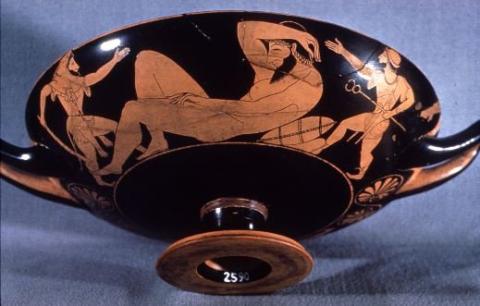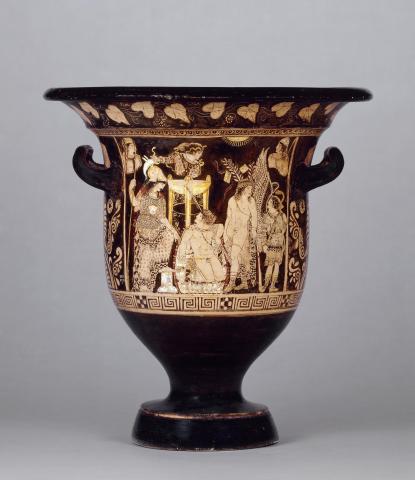Sed vīcit ista. quaeris Alcīdae parem?
nēmō est nisi ipse; bella iam sēcum gerat.85
Adsint ab īmō Tartarī fundō excitae
Eumenides, ignem flammeae spargant comae,
vīperea saevae verbera incutiant manūs.
ī nunc, superbe, caelitum sēdēs pete,
hūmāna temne! iam Styga et mānēs ferōs90
fūgisse crēdis? hīc tibi ostendam īnferōs.
revocābō in altā conditam cālīgine,
ultrā nocentum exilia, discordem deam,
quam mūnit ingēns montis oppositī latus;
ēdūcam et īmō Dītis ē rēgnō extraham95
quidquid relictum est: veniet invīsum Scelus
suumque lambēns sanguinem Impietās ferōx
Errorque et in sē semper armātus Furor—
hōc hōc ministrō noster ūtātur dolor.
Notes
Juno calls on the Furies (Greek Erinyes or Eumenides).
According to Homer and other authors the Eumenides live in the Underworld, carry out curses, bring about madness or blindness, and punish offences, in particular crimes within a family. According to Aeschylus (Eumenides 273–5; 339–40) and Vergil (Aeneid 6.605–7) they punish malefactors in the Underworld. Juno also calls on a series of allegorical figures of crime, seen as dwelling in the Underworld.
84 vīcit: Hercules helped the gods in fighting the Giants, as on a red-figure kylix (c. 525 BC), which depicts Hercules on the left sneaking up on the unconscious giant Alkyoneus, with Hermes helping on the right.
85 gerat: jussive subjunctive (AG 439).
86-8 adsint … spargant … incutiant: jussive subjunctives (AG 439).
86 Tartarī: the home of the Furies in the Underworld.
87 Eumenides: in Greek, “kindly spirits,” a euphemism for the Furies. In ancient art, the Erinyes are generally depicted with wings, snake-like hair, hunting-boots and in a short chiton; sometimes they carry torches or whips. They are shown on a 4th century BC vase from Paestum in south Italy, attacking Orestes after his murder of his mother. flammeae … comae: as shown in the image, the Furies are typically imagined to have snakes for hair. Seneca imagines them with fiery hair and using snakes as whips.
89-90 ī … pete … temne: Juno addresses these sarcastic imperatives to Hercules as she urges him to proceed from the Labors to Olympus.
89 superbe: vocative, referring to Hercules.
90 hūmāna: “human affairs.” See note on 30 for the neuter substantive. Styga: Greek accusative; see note on 54.
91 Juno promises to show Hercules hell on earth.
92 conditam: modifying deam (93).
93 nocentum: poets often use the genitive plural ending -um for present participles in place of the expected –ium for metrical purposes, especially when the participle acts substantively as a noun. discordem deam: “the goddess of discord.” the goddess Discordia is frequently imagined to start civil war in Latin poetry, and so is an apt figure to force Hercules to attack his own family.
94 Juno will set Discordia free from her imprisonment within a mountain cave.
96 quidquid relictum est: in part for metrical reasons, Seneca substitutes est in place of the more expected erit or sit. Juno intends to hurl at Hercules whatever kind of evil she can find in the Underworld.
97 The image of Impietās “licking its own blood” foreshadows the violence that Hercules will commit against own family.
98 in sē … armātus: “armed against itself.” The emphasis on self-harm in 97–98 connects with one of the major themes in Seneca’s philosophical writings, namely that extreme emotions typically result in greater harm to the subject who experiences them rather than the objects of his or her hatred, anger, or rage.
99 hōc hōc ministrō: the verb ūtor typically governs an ablative of instrument (AG 409). The repetition indicates Juno’s agitation, as again at 110 mē mē.
Vocabulary
Alcīdēs –ae. m.: a descendant of Alceus; Hercules
pār paris n.: an equal; a set of two
īmus –a –um: deepest, last
Tartarus –ī m.: Tartarus
fundus –ī m.: bottom, foundation
exciō excīre excīvī or exciī excītus and excieō excitus: to rouse up or forth; call forth
Eumenides –um f. pl.: Eumenides, the Furies
flammeus –a –um: fiery, flaming
vīpereus –a –um: viperous, snaky
verber verberis n.: whip, lash; a beating
incutiō incutere incussī incussus: to strike into or upon; add
temnō temnere: to despise
Styx, Stygis or Stygos: Styx, the river of Hades
mānēs –ium m. pl: souls or ghosts of the dead
inferī –ōrum m. pl.: the dead; the lower world
conditus –a –um: put away; hidden
cālīgō cālīginis f.: mist, fog; darkness
nocens nocentis: guilty
discors discordis: disagreeing
dea –ae f.: goddess
mūniō mūnīre mūnīvī mūnītus: to build, fortify; defend, shelter
oppōnō oppōnere opposuī oppositus: to set before, against; oppose
īmus –a –um: deepest, last
Dīs Dītis m.: Dis; Pluto
extrahō extrahere extrāxī extractus: to draw out
invīsus –a –um: hated
lambō lambere lambī lambitus: to lick
impietās, impietātis f.: impiety, disloyalty
ferōx ferōcis: bold; wild
armō –āre –āvī –ātus: to equip, arm
minister ministrī m.: attendant, servant


